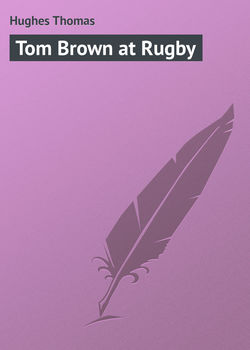Читать книгу Tom Brown at Rugby - Hughes Thomas - Страница 44
PART I
CHAPTER III
SUNDRY WARS AND ALLIANCES
THE REPROBATE
ОглавлениеThis ally of Tom's was indeed a desperate hero in the sight of the boys, and feared as one who dealt in magic, or something approaching thereto. Which reputation came to him in this wise. The boys went to bed at eight, and, of course, consequently lay awake in the dark for an hour or two, telling ghost stories by turns. One night when it came to his turn, and he had dried up their souls by his story, he suddenly declared that he would make a fiery hand appear on the door; and, to the astonishment and terror of the boys in his room, a hand, or something like it, in pale light, did then and there appear. The fame of this exploit having spread to the other rooms, and being discredited there, the young necromancer247 declared that the same wonder would appear in all the rooms in turn, which it accordingly did; and the whole circumstances having been privately reported to one of the ushers as usual, that functionary, after listening about the doors of the rooms, by a sudden descent caught the performer in his nightshirt, with a box of phosphorus248 in his guilty hand. Lucifer-matches and all the present facilities for getting acquainted with fire were then unknown: the very name of phosphorus had something diabolic in it to the boy mind; so Tom's ally, at the cost of a sound flogging, earned what many older folks covet much, – the very decided fear of most of his companions.
He was a remarkable boy and by no means a bad one. Tom stuck to him till he left, and got into many scrapes by so doing. But he was the great opponent of the tale-bearing habits of the school; and the open enemy of the ushers; and so worthy of all support.
Tom imbibed a fair amount of Latin and Greek at the school, but somehow on the whole it didn't suit him, or he it, and in the holidays he was constantly working the Squire to send him at once to a public school. Great was his joy, then, when in the middle of his third half-year, in October, 183-, a fever broke out in the village; and the master having himself slightly sickened of it, the whole of the boys were sent off at a week's notice to their respective homes.
The Squire was not quite so pleased as Master Tom to see that young gentleman's brown, merry face appear at home, some two months before the proper time, for the Christmas Holidays; and so, after putting on his thinking-cap, he retired to his study and wrote several letters, the result of which was, that one morning at the breakfast-table, about a fortnight after Tom's return, he addressed his wife with: "My dear, I have arranged that Tom shall go to Rugby249 at once, for the last six weeks of this half-year, instead of wasting them, riding and loitering about home. It is very kind of the Doctor250 to allow it. Will you see that his things are all ready by Friday, when I shall take him up to town, and send him down the next day by himself!"
Mrs. Brown was prepared for the announcement, and merely suggested a doubt whether Tom were yet old enough to travel by himself. However, finding both father and son against her on this point, she gave in, like a wise woman, and proceeded to prepare Tom's kit251 for his launch into a public school.
247
Necromancer: (one who communes with the dead) a conjurer.
248
Phosphorus: the yellowish, inflammable substance used in making common matches – in a pure state it burns on exposure to air. Matches – called "Lucifers" or "light-bringers" – were invented in England about 1829. Previous to that time the only way of striking a light was by flint and steel, the spark being caught on a bit of tinder (half-burnt rag) which was then blown into a blaze.
249
Rugby: a small village in Warwickshire on the river Avon, nearly in the centre of England. It is the seat of Rugby School, – one of the great public schools, – and was founded by Lawrence Sheriff, a native of the neighboring village of Brownsover, in the reign of Queen Elizabeth. The school owes its fame chiefly to Dr. Arnold, who became head master in 1827, and held the position until his death in 1842.
250
Doctor: Dr. Arnold.
251
Kit: here, clothes.
